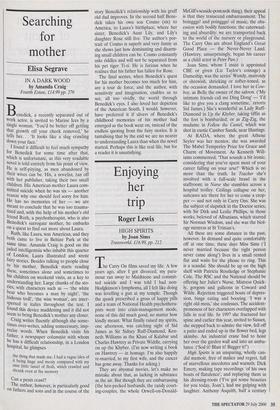Searching for mother
Elisa Segrave
IN A DARK WOOD by Amanda Craig Fourth Estate, £14.99 pp. 276 Benedick, a recently separated out of work actor, is invited to Marine Ices by a single woman. 'You'd be better off getting that growth off your cheek removed,' he tells her. . . 'It looks like a slug crawling down your face.'
I found it difficult to feel much sympathy for Benedick for some time after that, which is unfortunate, as this very readable novel is told entirely from his point of view. He is self-pitying, as men abandoned by their wives can be. His, a novelist, ran off with her publisher, taking their two small children. His American mother Laura com- mitted suicide when he was six — another reason why one should feel sorry for him. He has no memories of her — we are meant to conclude that he was too trauma- tised and, with the help of his mother's old friend Ruth, a psychotherapist, who is also Benedick's surrogate mother, he embarks on a quest to find out more about Laura.
Ruth, like Laura, was American, and they both came to live in Belsize Park at the Same time. Amanda Craig is good on the jaded intelligentsia who inhabit this quarter of London. Laura illustrated and wrote fairy stories. Besides talking to people close to his mother, Benedick starts reading these, sometimes alone and sometimes to his children on weekend visits, as a key to understanding her. Large chunks of the sto- nes, with characters such as — 'the white bear who becomes a man by night', 'the hideous troll', 'the wise woman', are inter- spersed in italics throughout the text. I found this device maddening and it did not seem to bring Benedick's mother any closer. Craig writes fluently although she some- times over-writes, adding unnecessary, imp- recise words. When Benedick visits his father, a newspaper columnist with whom he has a difficult relationship, in a London hospital, he glimpses
the thing that made me. I had a vague idea of it being huge and meaty compared with my own little tassel of flesh, which crawled and shrank even at the memory
Can a penis crawl? The author, however, is particularly good on fathers and sons and in the course of the story Benedick's relationship with his gruff old dad improves. In the second half Bene- dick takes his own son Cosmo (six) to America, to Laura's birthplace, where her sister, Benedick's Aunt Lily, and Lily's daughter Rose still live. The author's por- trait of Cosmo is superb and very funny as she shows just how dominating and disarm- ing small children can be. Cosmo constantly asks riddles and will not be separated from his pet tiger Ti-ti. He is furious when he realises that his father has fallen for Rose.
The final scenes, when Benedick's quest for his mother becomes too much for him, are a tour de force, and the author, with sensitivity and imagination, enables us to see, all too vividly, the world through Benedick's eyes. I also loved her depiction of the American South. I would, however, have preferred it if slivers of Benedick's childhood memories of his mother had emerged as the book went on, instead of the endless quoting from the fairy stories. It is tantalising that by the end we are no nearer to understanding Laura than when the novel started. Perhaps this is like real life, but for a reader it is unsatisfying.


























































 Previous page
Previous page